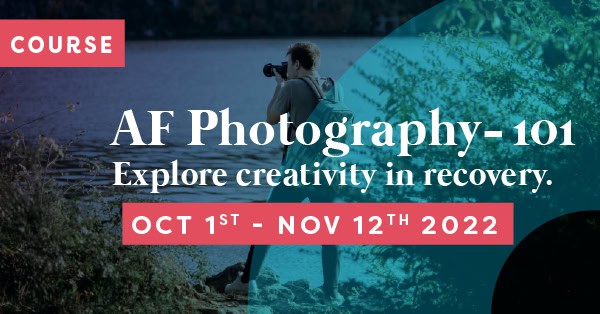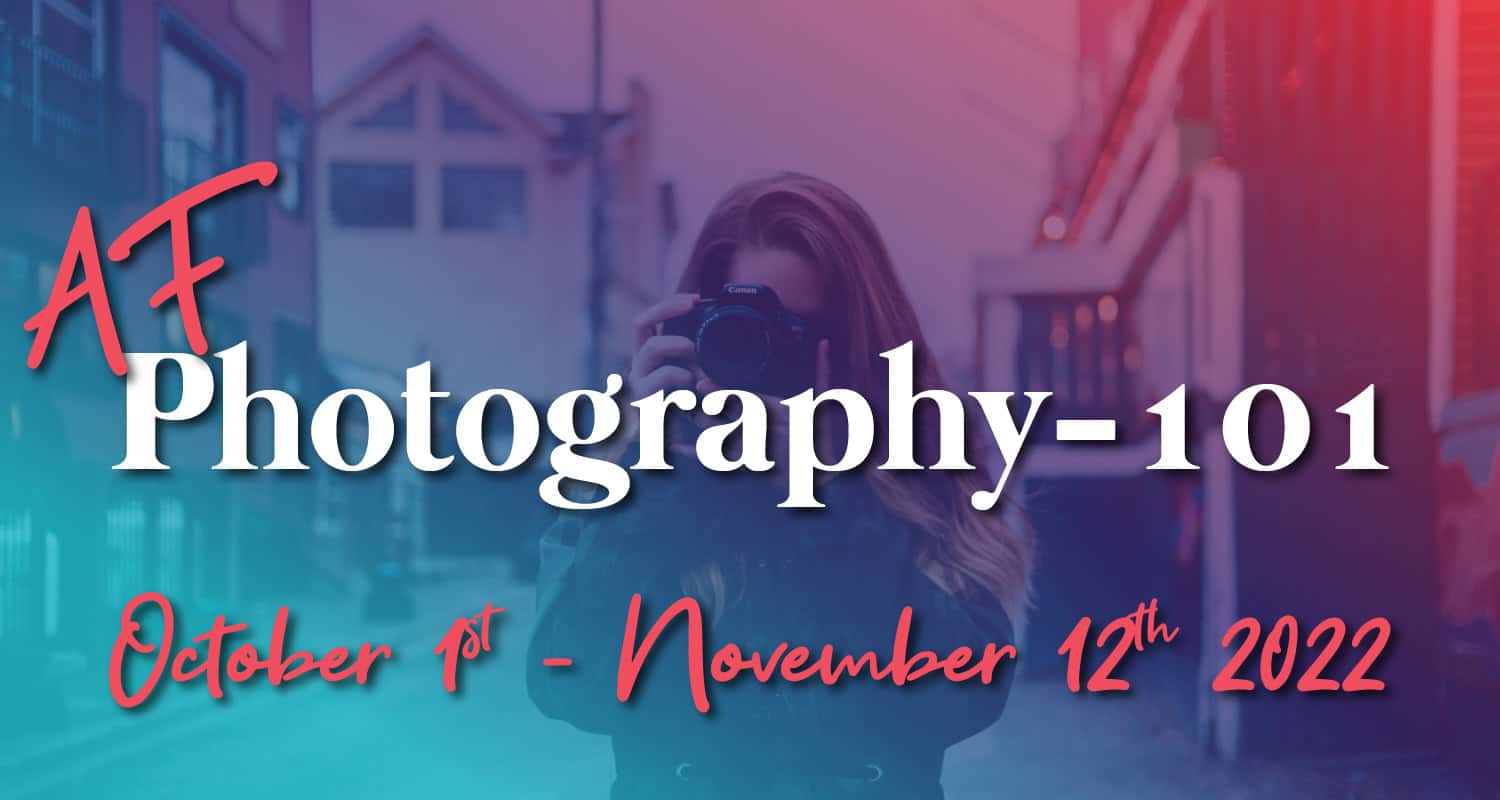
Here’s what you can expect in this Alcohol-Free Photography Course ?
Registration opens Thursday, September 1st
– Join us Saturdays at 1:00 p.m. EST for 7 consecutive Saturdays. Classes are 75 minutes including 15 minutes for dedicated Q&A. Classes will take place on Zoom and each session will be recorded with links to the videos emailed to you along with the course materials in the event you miss a session or would like to view a class multiple times. In addition to the weekly class sessions, the instructors will be available in the Zoom room for “office hours” at other times (to be determined) during each week to answer additional questions or provide more individualized assistance where desired.
– Get access to the closed, private and unsearchable AF Photo Facebook group where you can share photos, build accountability, and connect with other alcohol-free photographers.
– No prior photography experience is needed. All you need is a computer, internet connection, and a camera. While a dedicated camera with manual controls would be preferred, anyone with a modern smart phone has an extremely capable camera that will suffice. If you would like to get the most out of the course by learning to use a dedicated camera some suggestions for entry-level and intermediate level cameras are listed below.
– This is a three-part course. (1) Learn the fundamentals of photography. (2) Learn the power of artistic expression. (3) Support your sobriety through your artistic expression while creating accountability by becoming active in a community of other sober people interested in improving their photography.
– Why Photography? In this age of “smart” phones everyone has a capable camera available virtually all the time. However, most people just take “pictures.” Taking a “picture” is a merely a physical act where the camera records what that camera sees. Engaging in photography is an act of artistic expression where the photographer uses the camera as a tool to create an image based on the photographer’s vision. While modern phone cameras are quite good (and getting better all the time), knowing how to use a dedicated camera will allow a photographer to step up their photography game.
– Find out how artistic expression and, more specifically, the medium of photography can help with your alcohol-free journey. Human beings have always sought out means of artistic expression. Photography can help add balance to your life by providing an artistic outlet.
– This course is all about having fun. You will be placed in an accountability group where you will both give and receive support, encouragement, and constructive criticism as you work on weekly photography projects.
– Learn the basics of how the camera works—how to manually control shutter speed, aperture, and ISO, and why you would want to do that. Learn key concepts of photo composition and how to utilize your knowledge of the camera’s manual controls to create images that utilize compositional “rules.”
– Helping you quit drinking is a major part of this course. It is designed to help you develop and build your alcohol-free community by placing you within a subgroup that provides a greater opportunity for engagement and connection. Additionally, you will learn how to incorporate photography into a larger mindfulness program.
– Participate in intimate breakout room discussions where you can connect with others about the challenges of quitting drinking.
What Type of Camera Do I Need?
In order to get the most out of this course you will want to have a camera that provides you with the option of full manual controls. That being said, the best camera is the camera you have with you – and most of the time that will be your smart phone’s camera. Thus, while the course is designed for people with cameras that have full manual controls, it will also address how to best simulate that level of control with the modern smart phone camera. Therefore, you are welcome to use your phone’s camera for this course—however, please understand that the course is not specifically designed for phone cameras.
One note: While film cameras are making a bit of a comeback amongst a select audience, this course will focus solely on digital photography.
If you already have a digital camera that provides the ability to utilize manual controls such as aperture, shutter speed, and ISO you are set. If you would like to explore purchasing a camera, in the FAQ below are some entry level and mid-level suggestions for reputable camera brands/models
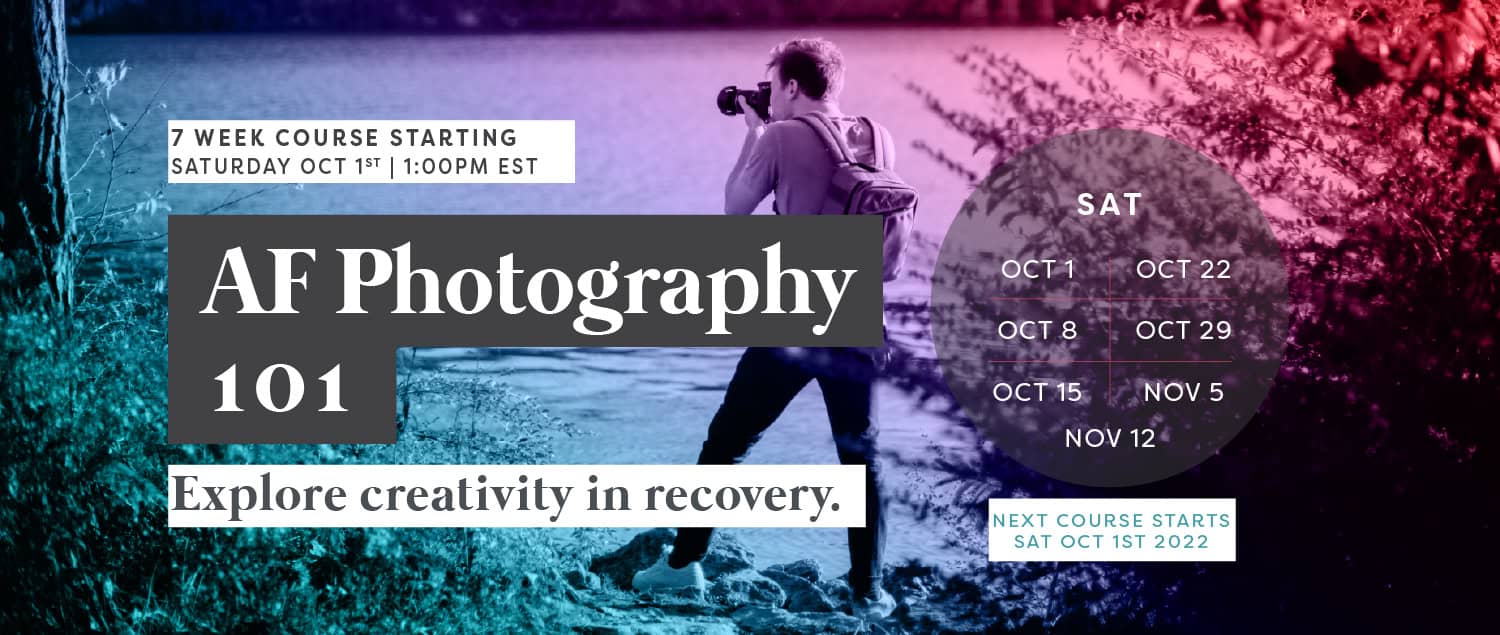
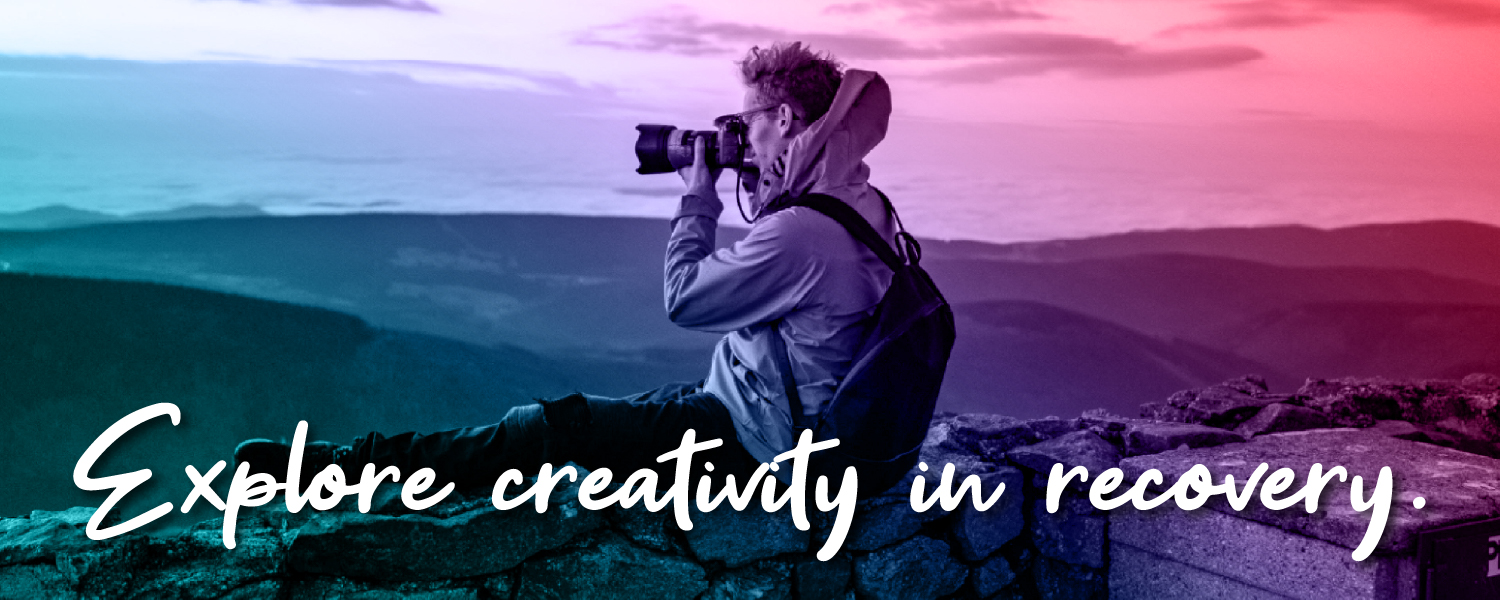
Course Schedule
Session 1: Saturday, October 1st 1:00 PM EST
– Meet your course instructors – Course orientation
– Learn how art contributes to recovery through expression
– Using photography to navigate cravings
– Introduction to apps and software for shooting and editing.
– Camera basics
-
- How to hold the camera
- Shooting modes
- What is composition
– Composition Lesson One – Rule of Thirds
Session 2: Saturday, October 8th 1:00 PM EST
– Rule of Thirds recap
– Exposure Triangle
-
- Learn the three ways light is captured by your camera
- What camera settings relate to each of these
- How each setting contribute to the look of your image
- Explore shooting modes to prioritize certain camera settings
– Composition Lesson Two – Leading Lines
Session 3: Saturday, October 15th 1:00 PM EST
– Leading Lines recap
– Digging into shutter speed
-
- How to freeze motion
- How to show motion
- What is ‘long exposure’ and how to use it
- Neutral density filters and their uses
– Composition Lesson Three – Motion
Session 4: Saturday, October 22nd 1:00 PM EST
– Motion recap
– Understanding Light
-
- Recognizing and creating hard or soft light
- What is Golden Hour
- Overcoming harsh lighting
- Introducing diffusion
- Adding light to your shot
– Composition Lesson Four – Complimentary Colors
Session 5: Saturday, October 29th 1:00 PM EST
– Complimentary Colors recap
– Understanding lens behavior
-
- What is focal length
- Creating bokeh
- Lens compression
- Focal plane
– Composition Lesson Five – Frame in a Frame
Session 6: Saturday, November 5th 1:00 PM EST
– Frame in a Frame recap
– An introduction to post production
– Digging into basics panels
-
- Adjusting lighting through editing
- Enhancing colors through editing
- Creating mood after the shot
– Gadgets and accessories that are worth owning
– Finding your influence
Session 7: Saturday, November 12th 1:00 PM EST
– Exploring other rules of composition
– Moving forward with photography
– Course highlights and virtual art show!
Recovery Elevator
AF Photography Course– Seven 75-minute course sessions on Saturdays
– Photography instruction by professional photographers
– Course work emailed directly after sessions
– Zoom link for course recording if you missed the session
– Practical tools and tips to help you quit drinking
– Learn how to take artistic photos in a fun sober community
– Access to the closed and private AF Photo Facebook Group
– Weekly office hours with instructors
Registration opens Thursday, September 1st
Meet your course instructors
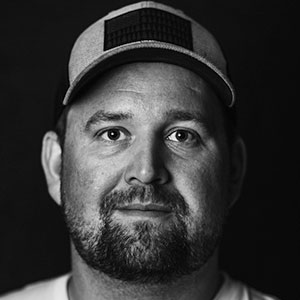
Kris is one of the voices of the Recovery Elevator podcast and has been a member of the Café RE community since 2017. Kris got his first film cameras in high school and has had an interest ever since. Through the years he enjoyed capturing the moments he was in, and remembering the people he was with. In 2011 he got his first DSLR and started learning the more technical aspects of photography. As his skill developed, Kris started to do professional work in his community. In recovery Kris has found that his passion for the art has been reborn. He has a special love for portraiture and landscapes, but embraces his curiosity for many types of photography and techniques. Kris is the photographer and videographer at Recovery Elevator retreats and has created most of the media on the Recovery Elevator website such as testimonial videos, group photos, and graphics.

Brian C. is a member of the Recovery Elevator community and Café RE who has been sober since April 28, 2019. Brian has been an amateur/hobbyist photographer from more than twenty years, but his interest in and practice of photography has reached new heights since choosing to lead an alcohol-free life. Brian can provide first-hand guidance on how taking up the hobby of photography can provide both an avenue for artistic expression as well as a vehicle for connection with others that can strengthen and support an alcohol-free lifestyle. While Brian’s past photography focused on travel and landscapes, his interest in other areas of photography (as with his interest in other avenues of personal growth) are ever-growing since embracing an alcohol-free life. Brian lives in South Carolina with his wife and their rescue dog Fannie Mae.
What type of camera do I need? Do you have suggestions on a camera to purchase?
In order to get the most out of this course you will want to have a camera that provides you with the option of full manual controls. That being said, the best camera is the camera you have with you – and most of the time that will be your smart phone’s camera. Thus, while the course is designed for people with cameras that have full manual controls, it will also address how to best simulate that level of control with the modern smart phone camera. Therefore, you are welcome to use your phone’s camera for this course—however, please understand that the course is not specifically designed for phone cameras.
One note: While film cameras are making a bit of a comeback amongst a select audience, this course will focus solely on digital photography.
If you already have a digital camera that provides the ability to utilize manual controls such as aperture, shutter speed, and ISO you are set. If you would like to explore purchasing a camera, below are some entry level and mid-level suggestions for reputable camera brands/models
** Some of these are Amazon links where Recovery Elevator earns a small affiliate fee***
Entry Level Suggestions: These are for the beginner who wants to learn the technical aspects but recognizes that this level of camera will, ultimately, be outgrown as they learn. While entry-level – these cameras are surprisingly powerful and are more than capable of taking excellent photgraphs.
Nikon – d3500 w/18-55 lens – $644.95
Canon – EOS Rebel T7 w/18-55 lens – $444.99
Sony – Alpha 6000 w/16-50 lens – $698.00
Fujifilm – X-T30 II w/15-45 lens – $999.95
Olympus – OM-D EM10 IV w/14-42 lens – 799.99
Panasonic – Lumix G7 w/14-42 lens – $597.99
Mid-Level Suggestions: While the above “entry level” recommendation are for beginners, these “mid-level suggestions are more of an “entry level” into camera systems intended for more experienced consumers (“prosumers”).
Canon – EOS RP w/24-105 lens – $1,299.00
Sony – a7 II w/28-70 lens – $1,598.00
Olympus – OM-D E-M5 III w/12-45 PRO lens – $1,299.00
Fujifilm – X-T4 w/18-55 lens – $2,099.00
Panasonic – S5 w/20-60 lens – $2,197.99
What is your refund policy?
Refunds are issued for 14 days after the course start date. No questions asked.
Who is this course for?
This course is for the new comer to both photography and sobriety. It’s geared towards anyone who is seriously questioning their relationship with alcohol or for someone who has previously tried to quit on their own and didn’t have the success they wanted. In addition, if you’ve recently quit drinking and are looking for a fun new hobby or healthy ways to fill your time, this course is for you. This course will also address the basics of taking artistic photos, how to work with light, how to use the manual settings on your camera and more.
What if I missed the webinar? Can I attend this course if I live on the other side of the world?
All sessions are recorded and a link is sent out within 3 hours of the course. We do recommend attending “live” as much as possible so you can participate in the small group breakout discussions and share experiences with your group. This course is on a Saturday midday so those in the EU can join. We do not recommend this course unless you can attend at least 5 of the 7 sessions live. It’s important you are there at the sessions so you are up to speed on what’s happening with the course.
I see there is a photo sharing session on week 7? what does that look like?
That is correct! Week 7 is the course finale where you share your best photos over the previous 7 weeks and the cohort will vote on best photos based on certain categories or criteria.
Oops, I drank during the course... now what?
You wouldn’t be the first or the last. Our advice is to keep showing up. Over and over. You betcha we value continuous alcohol-free time, but we feel there are other more important parameters of success, such as loving yourself, letting the inner artist out, and having fun while learning a new skill or hobby.
Is there a discount for Café RE members?
Yes, check the weekly Café RE email or email kmac@recoveryelevator.com for the Café RE discount code.
Can I sign up after the course start date?
Yes, but registration closes after the second Saturday.
Is this course 12-Step based?
No, it isn’t. However, since this course has an underpinning to sobriety, there will probably be mention of A.A. Course instructors have experience or currently attend A.A and we feel this course, in conjunction with your 12-Step program should add some major sobriety fuel to the tank.
Is this a religious or spiritual based course?
Religious no, but spiritual yes. We feel art is an expression of the divine and we must be connected to source if we are to accurately capture it.
Learn how to take captivating photos like this!
